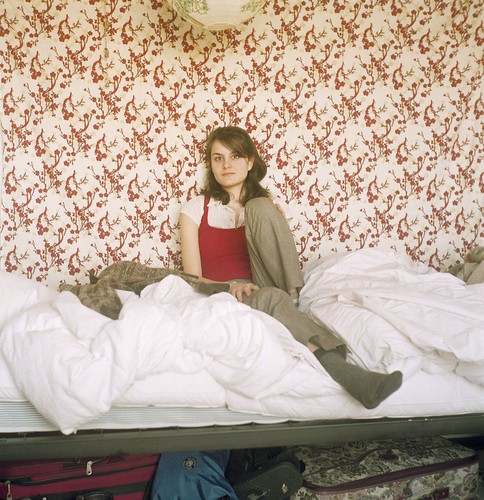
brittany, originally uploaded by Diana Kimball.
A year ago, I stopped taking pictures. For 2008: a photograph every day, a promise. I meant to take pictures of people I loved. And strangers, asking them, politely, to step outside. In three months, I photographed almost no one. I photographed laundry, inanimate things, myself, avoiding. I was going about things the wrong way.
I got stuck at asking politely. I couldn't bring myself to ask at all. My then-silver pocket camera, unwieldy, felt like a mistake: too common, and it didn't give me the license to impose. I suppose I imagined that a larger, sturdier camera might.
Friends and strangers reflexively resist having their picture taken. But since I stopped trying, I've realized that most people are willing to sit for portraits. The chance to be known, or shown something of yourself you didn't already know, beckons delicately. I smile warily for pocket cameras, plead silently with sturdy ones. What do you expect to see through you? The contraption in between becomes a contract. I will see you if you let yourself be seen.
Portraits and interviews: people seldom mind. Before it was spring, I spent time reading about Katy Grannan and her project of photographing true strangers, found through newspapers. "I was uncomfortable approaching people I didn't know," she told a reporter. "Out of that trepidation I started to place ads." Out of trepidation, they responded. Furtively, innocently they invited her into their homes. What motivated them, Grannan thought, might have to do with a "longing for new experience and for transformation." To be transformed into someone you do not recognize, by someone whose station or countenance commands respect. What an honor. What personal calamity.
I read about Grannan because I was reading about photographers, because this semester (the last) I'm taking photography. It was a conscious decision, since I've been disappointed for a long time about the way last year's effort ended. There were obstacles I wanted to run into, to feel their size. The first was a camera, and so I'm borrowing a Yashicamat, shooting on medium-format film. (And all the pictures are squares.) The camera introduces more obstacles: real, mechanical, freeing constraints. I can't take a photograph without looking down.
The other obstacle, though, was the problem of imposition. How do you ask someone to sit still while you adjust knobs, taking photographs that might blur, walking up close to them, light meter in hand? Then again: how does anyone ask someone else to take the time, arrange the equipment, to capture them looking beautiful, or some essential self? The imposition goes both ways. And, though lately it's photographs, I have a feeling it's this way for profiles, too. I, a journalist, want to know you and discover something unknown. You, famous or ordinary, won't admit that you want the same.
Imposing on someone else's time, space, or secrets is a terrifying task. Asking for trespass is terrifying, too; most people never do. The intimacy of imposition, filtered through the license of a camera or a promised story: still, what it's like to need one another.
In the photograph above, Brittany: who let me come to her room and photograph her in fading light.



3 comments:
My advice when photographing strangers, for what it's worth:
When you ask a stranger if you can take their picture they wonder who; why; what for; etc. This will diminish the intimacy/authenticity/quality of the shot. So answer their forthcoming questions preemptively. The best way I've found to do this is be very, very honest. If you see a pretty shirt, scene, smile, etc. let the subject know with an "Excuse me. That's one helluva ___. Mind if I grab a quick one for ____?". And if they say no: "I hate to pry but I've written about people's reactions to photographers. It fascinates me. If you don't mind my asking, why'd'ya say no?" This will either soften them up or aggravate them to no end. If it softens them up, make a friend; get the info. Who knows, maybe they'll change their mind. If it aggravates them, so what? You're a photographer. Your objective is to take pictures.
Diana - do you want to trade? I used to do pencil/charcoal portraits of friends in high school, but stopped afterwards because drawing portraits of strangers in public places felt weird. (I still do quick sketches occasionally, but staring at someone for 20 minutes is... odd.)
If you'd like to swap portraits, we should hang out some afternoon.
I take lots of photos too and the following was a self-revelation.
I resist photographs and finally wondered why. It is because too many photographers insist on "Come on, big smile!" which make most look like grinning idiots. So if you can convey to the subject that he-she can pose or not pose in any way he-she wants, I promise, you will get a much better response. It's a control issue.
Good luck!
Post a Comment